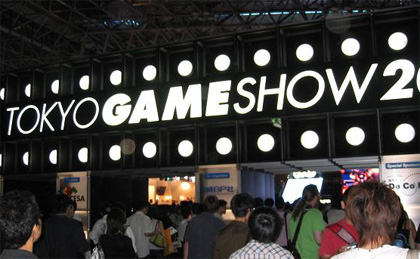 The Tokyo Game Show, billed as the world’s largest computer entertainment fest, kicked off Thursday with hopes that depressed sales of game consoles will enjoy a holiday resurrection.
The Tokyo Game Show, billed as the world’s largest computer entertainment fest, kicked off Thursday with hopes that depressed sales of game consoles will enjoy a holiday resurrection.
Hurt by the global recession and few blockbuster releases, the video game industry has been in a slump for much of the year. U.S. sales of video games in August tumbled for the sixth straight month, according to market researcher NPD Group.
But the sector expects a better fourth quarter, especially now that the “big three” — Sony Corp., Microsoft Corp. and Nintendo Co. — have announced bold price cuts on their game machines. The show is seen as the last major international venue for gaming companies to showcase their products and create momentum heading into the critical holiday shopping season.
Nintendo, which does not officially participate in the Tokyo Game Show, managed to draw the biggest headlines of the day by announcing hours before the event opened that it will slash $50 off its popular Wii console to $200 and lower prices in Japan by 20 percent to 20,000 yen.
Launched in 2006, Nintendo’s Wii hit 50 million unit sales worldwide in March 2009 — the fastest sales pace of any video game machine ever.
With a $50 price cut, the Wii will be tied with Microsoft’s low-end Xbox 360 Arcade as the cheapest console. Following $100 price cuts in August, Microsoft’s Xbox 360 Elite and Sony’s basic PlayStation 3 now cost about $300.
Console price cuts are customary for the video game industry after the systems have celebrated a birthday or two. The recession, however, has made them even more important, especially as game companies gear up for the holiday shopping season when the video game industry makes most of its money.
In a keynote address, Kazuo Hirai, head of Sony’s games business, touted the immediate impact of the price cut. The company has sold 1 million units over the last three weeks, he said.
Hirai said the industry must evolve if it wants to expand, though he did not announce any new games or specific strategies from Sony.
“If we stick with conventional business, we may not be able to achieve further growth,” Hirai said in front of a standing-room-only audience. “We have to be flexible in thinking and designing new games and business models.”
Microsoft is also bullish on the holidays and beyond, and expects new games like its recently released “Halo 3: ODST” to help drive console sales. It also hopes to benefit from the buzz over its new motion control device, codenamed “Project Natal.” The yet-to-be-released system combines a camera, depth sensor, microphone and processor to eliminate the need for a traditional controller.
At a private demonstration, the Redmond, Wash.-based company showed The Associated Press several Natal-based prototypes including “Ricochet,” a soccer-like game in which players to use their hands, legs and body to bounce balls at targets. Kudo Tsunoda, Project Natal’s creative director, also loaded up a Natal version of “Space Invaders” that requires players to move left and right while moving their forearms up and down to shoot.
Without specifying when it plans to launch the platform, Microsoft said Thursday that some of the industry’s biggest game publishers are developing titles for the Project Natal platform, including CAPCOM, Konami, Sega, Activision Blizzard and Electronic Arts.
“When we talk about a new innovation like Project Natal, it builds on top of the investment they make in our console,” said Phil Spencer, corporate vice president of Microsoft Game Studios. “When people go into this holiday and they make a console purchase or a game purchase … they know that that’s an investment that will continue to grow with them, which is an important value proposition for people in today’s world.”
The four-day Tokyo Game Show features 180 exhibitors and opens to the public on Saturday and Sunday. About 180,000 people are expected to attend.
Editors' Recommendations
- The video game industry has laid off thousands this year. Here’s what that means for you
- One of the best Lego games ever kicks off PS Plus’ 2024 additions
- The best video game remakes of all time
- The biggest gaming news of 2023: Insomniac leak, GTA 6 reveal, and more
- We predicted gaming’s 2023 future last December. Here’s what we got right


